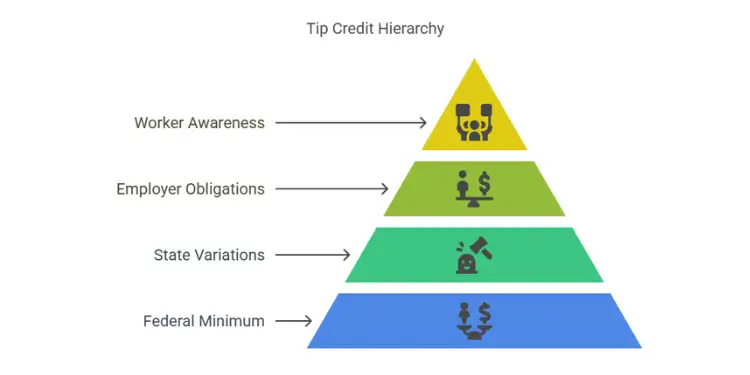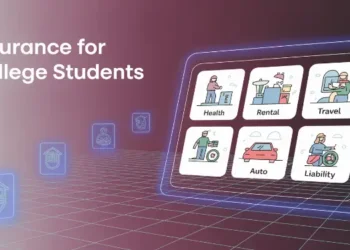The tipped minimum wage system affects millions of service workers in America every day. It’s key for those in restaurants, hotels, or other service jobs where tips are a big part of their pay.
Did you know servers in 15 states only make $2.13 an hour as their base wage? The Economic Policy Institute says tipped workers face poverty twice as much as non-tipped ones.
“The difference between tipped and standard minimum wages can mean thousands of dollars in annual income,” says labor economist Sylvia Martinez.
I’ve seen many coworkers deal with unpredictable service industry wages in restaurants. The Fair Labor Standards Act (FLSA) sets the federal rules. But, state laws can offer more protection and change how much you earn.
Quick hits:
- Federal tipped minimum: only $2.13
- Employers must cover wage gaps
- State laws vary significantly
- Tip reporting affects your protection
- Know your server pay rights
Definition of tipped minimum wage
In the service industry, workers get a special wage called the tipped minimum wage. This wage is lower than the regular hourly pay. It’s for workers who get tips from customers.
The tipped minimum wage is $2.13 per hour now (as of 2023). This is much less than the $7.25 per hour regular minimum wage.
This lower wage is okay because of the “tip credit” system. The Fair Labor Standards Act (FLSA) lets employers pay less. But, tips must make up the difference. This system has rules to protect workers.
A tipped employee gets more than $30 in tips each month. This includes servers, bartenders, and valets. They must earn the full minimum wage when tips and wages are added together.
Even though the federal wage is $2.13, some states have higher wages. Places like California, Oregon, and Washington don’t use the tip credit. They make employers pay the full state minimum wage, no matter the tips.
Tip Credit Structure and Limits
The tip credit is key to the tipped wage system. It’s the amount of tips that count toward the minimum wage. Employers can use up to $5.12 of tips per hour.
Here’s how to figure out the tip credit:
Full Minimum Wage – Direct Cash Wage = Maximum Tip Credit
$7.25 – $2.13 = $5.12 (federal maximum)
This means employers can use up to $5.12 of tips to meet the minimum wage. But, if tips and wages don’t add up to the full wage, the employer must pay the difference.
For example, if a server works 8 hours and earns $30 in tips, their total pay would be:
$2.13 × 8 hours = $17.04 (direct wages)
$17.04 + $30 (tips) = $47.04 (total compensation)
The full minimum wage for 8 hours is $7.25 × 8 = $58. The server’s total pay of $47.04 is short. So, the employer must pay an extra $10.96 to meet the minimum wage.
State laws make the tipped wage system more complex. Many states have higher wages than the federal $2.13. Some states don’t use the tip credit at all. They make employers pay the full state minimum wage, no matter the tips.
| State | Tipped Minimum Wage | Regular Minimum Wage | Maximum Tip Credit | Notes |
|---|---|---|---|---|
| Federal | $2.13 | $7.25 | $5.12 | Baseline requirement |
| California | $16.00 | $16.00 | $0.00 | No tip credit allowed |
| New York | $10.65 | $15.00 | $4.35 | Varies by region |
| Texas | $2.13 | $7.25 | $5.12 | Follows federal minimum |
| Washington | $16.28 | $16.28 | $0.00 | No tip credit allowed |
It’s important for employers and employees to understand these rules. The tip credit system is meant to help workers who earn more from tips. But, it also makes sure employers follow the law to pay workers enough.

Workers should know their state’s laws about tipped wages. If tips and wages don’t add up to the minimum, employers must pay the difference. This is a rule many workers don’t know about.
Definition of regular minimum wage
The regular minimum wage is the lowest pay that workers get in America. It stops employers from paying too little. It’s the same for everyone, no matter the job or if they get tips.
The federal minimum wage is $7.25 an hour. This has been the same for 13 years. But, many states have higher rates for their workers.
Some states like California and Washington have higher minimum wages. If a state’s wage is higher than the federal one, workers get the higher rate.
The regular minimum wage is for most workers. But, some groups like tipped workers and students get special rules.
- Student workers in certain programs
- Workers with disabilities (under specific circumstances)
- Youth employees during their first 90 days of employment
- Some seasonal and recreational establishment employees
There’s a big debate about raising the minimum wage. Some say it helps fight poverty and boosts the economy. Others worry it might cause jobs to disappear or prices to go up.
To find out the minimum wage in your area, check your state’s labor department website. They have the latest rates and plans for future changes.
Tipped workers need to know about the regular minimum wage. It’s the base for how much they can earn. If tips and wages don’t add up to the minimum, the employer must make up the difference.
“The minimum wage was not created to be a comfortable living; it was created to eliminate conditions of sweated labor, which existed in certain industries.”
Knowing about the regular minimum wage is key for all workers. It’s very important for those in service jobs. It helps make sure you get paid fairly for your work.
Read More:
Eligibility criteria for tipped employees
Not every service worker is a tipped employee under federal laws. They must meet certain criteria. I’ve seen how not knowing these rules can cost workers thousands.
The Fair Labor Standards Act (FLSA) says a tipped employee gets over $30 in tips a month. This low amount means most workers who get tips qualify.
But, there’s more. You must get tips regularly as part of your job. This decides if you can be paid less.
| Occupation | Typically Considered Tipped | Common Tip Structure | Special Considerations |
|---|---|---|---|
| Restaurant Server | Yes | 15-20% of bill | May participate in tip pools |
| Bartender | Yes | $1-2 per drink or percentage | Often shares tips with barbacks |
| Hotel Bellhop | Yes | $1-5 per bag or service | Tips may vary by hotel class |
| Valet Attendant | Yes | $2-5 per vehicle | Weather conditions affect amounts |
| Nail Technician | Yes | 15-20% of service cost | May have booth rental arrangements |
Job titles don’t always mean you’re a tipped employee. It’s about your job duties and if you get tips. For example, a hostess might not qualify, even in a restaurant.
There are many wrong ideas about who gets tips:
- Back-of-house staff (cooks, dishwashers) don’t get tips from customers
- Managers and supervisors can’t be in tip pools under current rules
- Employers can’t just say any job is tipped to pay less
If you get tips, tell your employer. The IRS wants to know about all tips, cash or credit card. Your employer needs this for taxes and wages.
States have their own rules for service workers. Some states pay the full minimum wage before tips. Other states have different rules.
Check your pay stubs to see if you’re paid as a tipped worker. Ask for your employer’s tip credit notice. For sure answers, call your state’s labor department or the federal Department of Labor’s Wage and Hour Division.
“The determination of whether an employee is a tipped employee is critically important because it affects minimum wage compliance. Employers cannot simply designate employees as ‘tipped’ to justify paying the lower direct cash wage.”
Knowing your wage rules is key. If you think you’re misclassified, keep records of your job and tips. Then, talk to your employer or file a complaint.
Key differences tipped versus regular wages
Tipped and regular wages are different in many ways. They affect how much money workers make and how they handle taxes. Knowing these differences helps everyone in the service industry.
Hourly Pay Calculation Methods Compared
Regular wages are easy to figure out. You just multiply hours worked by the minimum wage. For example, 40 hours at $7.25 is $290.
Tipped wages are more complicated. They use a three-part formula:
- Base tipped wage (as low as $2.13 federally)
- Tips received during the pay period
- Potential “make-up” pay if the combination falls short of regular minimum wage
Let’s look at a server’s pay in a state with the federal minimum tipped wage of $2.13:
| Scenario | Hours Worked | Base Pay | Tips Earned | Total Hourly Rate |
|---|---|---|---|---|
| Busy Weekend | 8 | $17.04 ($2.13/hr) | $200 | $27.13/hr |
| Average Weekday | 8 | $17.04 ($2.13/hr) | $80 | $12.13/hr |
| Slow Shift | 8 | $17.04 ($2.13/hr) | $25 | $5.26/hr* |
*In the slow shift scenario, the employer must provide an additional $16 in make-up pay. This brings the total to $58 for that shift.
Regular wage earners get the same amount every week. Tipped workers’ pay changes a lot. It depends on how busy they are and the weather.
Reporting and Recordkeeping Requirements Rules
Tipped workers have to report their tips every month. They use Form 4070 or a system their employer provides. Employers have to:
- Collect and maintain employee tip reports
- Withhold income taxes on reported tips
- Pay employer share of FICA taxes on all reported tips
- Document tip credit notifications provided to employees
- Maintain records proving employees earned at least minimum wage when tips and base pay are combined
Regular wage workers don’t have to do any of these things. Their employers just track hours and wages. It’s much simpler.
“The most common mistake I see service workers make is failing to keep personal records of their tips. When wage disputes arise, those who maintain their own tip logs have significantly better outcomes.”
Tax rules are different too. Tipped workers have to track cash tips. Credit card tips add more complexity. Employers often give these tips after taking fees.
I suggest service workers keep records. This includes:
- Daily tip totals (cash and credit separately)
- Shift hours and sections worked
- Copies of employer tip credit notifications
- Pay stubs showing reported tips and withholdings
These records help protect against wage problems. They also help with taxes. It’s more work, but it’s important for tipped workers.
Related Posts:
Common compliance pitfalls for employers
Service industry employers often face problems with tipped minimum wage systems. These issues can lead to costly violations. Knowing these problems helps workers and employers follow service industry labor laws.
One big problem is when tips don’t cover the full minimum wage. If tips plus the tipped wage don’t meet the regular minimum, employers must pay the difference. This “tip credit” system needs careful tracking and honest reporting.
Another issue is when employers take too much from tips. Some states let employers deduct a small amount for credit card fees. But, taking more than 1-3% is not allowed and could be a minimum wage violation.
Employers sometimes make illegal deductions. These can make pay below minimum wage. Examples include:
- Charging for uniforms or equipment
- Deducting for register shortages or walkouts
- Requiring servers to pay for broken dishes
- Imposing excessive side work duties while paying the tipped wage
Keeping a record of your hours, tips, and any issues is key. Write down dates, times, and details of any problems. This evidence is important if you need to report a violation.
Tip Pooling Legality and Fairness
Tip pooling systems are complex for employers. These systems make workers share tips, but there are strict rules.
There are two types of tip pools: mandatory and voluntary. Mandatory pools require everyone to participate. Voluntary pools let workers choose. Both must follow tip pooling regulations to be legal.
In 2018, the Department of Labor changed the rules. Now, back-of-house staff like cooks and dishwashers can join tip pools under certain conditions. This is allowed if:
- The employer pays the full minimum wage (not using the tip credit)
- The tip pool is mandatory, not voluntary
- The system is fair and reasonable
But, one rule is clear: managers and supervisors can’t join tip pools. This rule applies even if they do the same work as tipped employees. The main reason is their role in hiring, firing, or directing others.
| Who Can Receive Tips From Pools | Who Cannot Receive Tips From Pools | Special Conditions |
|---|---|---|
| Servers, bartenders, bussers | Managers and supervisors | Always permitted in legal tip pools |
| Hosts and food runners | Business owners | Generally permitted in most tip pools |
| Cooks and dishwashers | Administrative staff | Only if employer pays full minimum wage |
Signs of illegal tip pools include:
- Management taking a portion of tips
- Unexplained deductions from your tip share
- Lack of transparency about how tips are distributed
- Dramatically uneven distribution that seems arbitrary
- Inclusion of non-service employees when the employer takes a tip credit
Tip theft is common. If you think your tips are being mishandled, document everything. Note your earnings, what was distributed, and any statements from management about fair tip distribution.
Legal actions for tip violations include filing complaints with state labor departments or the federal Department of Labor’s Wage and Hour Division. These agencies can investigate, order back pay, and impose penalties on employers who break tip pooling regulations.
Knowing these common issues helps you spot problems and maintain good work relationships. The goal is to follow the rules that protect workers and businesses in the service industry.
Check out the below:
Practical advice for service staff
As a service worker, keeping good records is key. Write down your tips, hours, and base wages every day. This helps protect you from wage theft and proves your case if needed.
If you think you’re being cheated, talk calmly to your boss first. Show them your records and know the laws in your state. If it doesn’t work out, reach out to your state’s labor department or the federal Department of Labor.
Smart tip management means knowing when you make more money. Ask for busy shifts and learn ways to make guests happy. Keep track of your earnings to predict changes.
For financial stability, plan ahead. Save for taxes every quarter, as most employers only take out base wage. When applying for loans or housing, show several months of income records. This proves you’re stable, even with daily changes.
Groups like Restaurant Opportunities Centers United and One Fair Wage help service workers. They give advice and push for fair wages. Joining these groups can help you and others in the service industry.
Knowing your rights is your best defense. The tipped wage system is complex, but being informed helps you earn more and secure your future.












